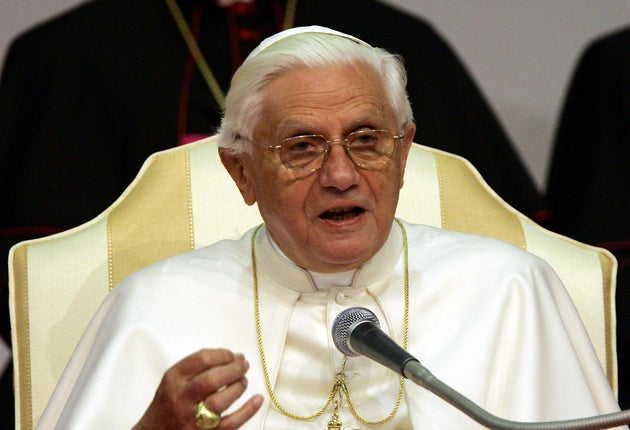Pope’s former diocese implicated in abuse scandal
Unnamed priest moved to Munich in 1980 after being accused of child sex abuse

Your support helps us to tell the story
From reproductive rights to climate change to Big Tech, The Independent is on the ground when the story is developing. Whether it's investigating the financials of Elon Musk's pro-Trump PAC or producing our latest documentary, 'The A Word', which shines a light on the American women fighting for reproductive rights, we know how important it is to parse out the facts from the messaging.
At such a critical moment in US history, we need reporters on the ground. Your donation allows us to keep sending journalists to speak to both sides of the story.
The Independent is trusted by Americans across the entire political spectrum. And unlike many other quality news outlets, we choose not to lock Americans out of our reporting and analysis with paywalls. We believe quality journalism should be available to everyone, paid for by those who can afford it.
Your support makes all the difference.Pope Benedict XVI was directly implicated in a deepening Catholic Church sex abuse scandal for the first time late yesterday following disclosures that he unwittingly approved the transfer a priest who forced an 11-year-old boy to have oral sex.
The priest, who was named by Germany's Südeutsche Zeitung only as priest "H", was transferred in 1980 from his parish in the German town of Essen to the Pope's former diocese in Munich after he was accused of forcing the boy to perform sex acts. The priest was sent to Munich to undergo therapy, but six years later he was convicted of abusing minors. He was given an 18-month suspended prison sentence and fined the equivalent of €2,000 (£1,800). The newspaper said that he continues to work as a priest in Bavaria.
The Pope, then known as Joseph Ratzinger, was a German Catholic cardinal at the time. His Munich diocese insisted yesterday the decision to allow the convicted paedophile priest to continue working had been taken by Gerhard Gruber, 81, its principal vicar.
Monsignor Gruber yesterday issued a statement in which he bitterly regretted the decision and accepted full responsibility for the priest's transfer. The diocese insisted the Pope had not known about the decision. "I deeply regret that the decision led to offences against youths," Monsignor Gruber was quoted as saying.
Separately, Pope Benedict fervently defended the Vatican's insistence on celibacy among priests yesterday in the face of a deepening and increasingly serious church sex-abuse scandal which has been blamed on out-of-date rules and moral constraints applied to the Catholic clergy.
The Pope was addressing a theological conference hours before a key meeting with Germany's most senior bishop to discuss widespread child sex abuse in Catholic institutions across Germany. Describing celibacy as "sacred", the Pope insisted: "It is the sign of full devotion, the entire commitment to the Lord and to the Lord's business, an expression of giving oneself to God and to others."
The Pontiff's unequivocal backing for celibacy came amid fresh allegations of abuse at church institutions in Europe, this time at the internationally renowned, Catholic-run Vienna Boys Choir, and suggestions that celibacy in the priesthood helped to foster such scandals. Catholic-run institutions in Ireland and Holland have also been affected.
The Pope's remarks appeared directly to rebuff comments made by the Vienna-based Austrian Cardinal Christoph Schönborn who argues in the latest edition of his diocesan magazine that celibacy may have encouraged sex abuse. "The issue of priest training, as well as what happened in the so-called sexual revolution", needed to be addressed, the cardinal wrote, adding: "It also includes the issue of priest celibacy and the issue of personality development. It requires a great deal of honesty both on the part of the Church and society as a whole."
Monsignor Robert Zollitsch, Germany's most senior bishop, told the Pope at their meeting yesterday about measures the German church has taken to investigate the country's growing sex-abuse scandal. "With great shock, keen interest and deep sadness, the Holy Father took note of what I had to say," Monsignor Zollitsch said . " We want to bring the truth to light."
The Pope yesterday faced demands from German politicians that he should personally apologise to Church abuse victims. The Vatican has also been accused of deliberately shielding priests who commit sexual offences by transferring them abroad. The Pontiff had not been expected to comment directly on the subject although he has previously condemned the practice as one of the "gravest crimes".
In Germany alone there have been some 200 reported cases of sexual abuse at more than 29 separate Catholic schools, colleges and other Church-run institutions. They include the famous Regensburger Domspatzen boy's choir which was run by Monsignor Georg Ratzinger, the Pope's brother, for 30 years until 1994. This week, Monsignor Ratzinger has admitted slapping choirboys, but said that was a normal way of keeping discipline. But he denied any knowledge of sexual abuse. At the time, the Pope was still in Germany serving as archbishop of Munich and Freising.
Join our commenting forum
Join thought-provoking conversations, follow other Independent readers and see their replies
Comments